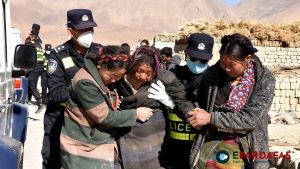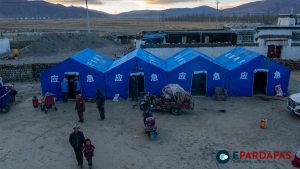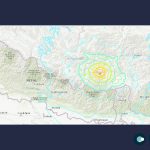
Snow melting in Nepal Himalayas may imperil Bangladesh’s existence: B’desh Minister

Bangladesh’s Minister for Environment, Forest, and Climate Change, Saber Hossain Chowdhury, has expressed concern that Bangladesh’s existence might be imperiled by the melting of snow in the Nepal Himalayas due to climate change.
Addressing the ‘Global Dialogue on Mountain, People, and Climate,’ which kicked off today in Kathmandu to draw global attention to the impact of climate change in the Himalayas, he said climate change has severely impacted the Himalayas, leading to rapid snowmelt. This could result in problems such as flooding in Bangladesh. The Bangladeshi minister emphasized that the very existence of the downstream and coastal regions is at risk due to the melting of snow in the Himalayas if timely measures are not taken to mitigate the impact of climate change.
He stressed the importance of minimizing the impact of climate change and enhancing adaptation measures to ensure climate resilience.
“The developed countries emit 81 per cent of the total global carbon emissions. Developing countries like Nepal and Bangladesh are suffering as a result. The developed countries have not fulfilled their commitments made at various climate conferences regarding lowering carbon emissions. Now, they should be held accountable,” he added.
Stating that the government alone cannot alleviate poverty and prevent the impacts of climate change, Minister Chowdhury emphasized the need to secure the budget required for implementing climate change adaptation programs. “Political will is needed to address the problems created by the adverse impacts of climate change,” he reiterated.
Experts from 25 countries are participating in the Global Dialogue. More than 200 representatives from mountainous and small island nations, including Nepal, the international community, development partners, INGOs, the private sector, and civil society, are attending the program.
The experts will deliberate on topics such as coordination, prioritizing, and strengthening climate-resilient activities based on mountain ecosystems.
- Kaski Court Grants Bail to Rabi Lamichhane in Embezzlement Case
- Upper Mustang Sees Over 4,000 Foreign Tourists in 2024, Marking a 14% Rise
- Hollywood Wildfires Ravage Los Angeles, Claiming Lives and Thousands of Homes
- Nepal Deports 147 Chinese Nationals in 2024 Amid Rising Concerns Over Crimes and Overstays











Comments